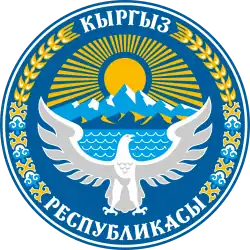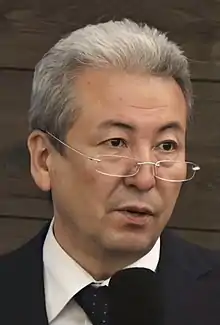2021 Kyrgyz presidential election
Snap presidential elections were held in Kyrgyzstan on 10 January 2021,[1][2] alongside a constitutional referendum. The elections were called early following the resignation of President Sooronbay Jeenbekov in the wake of the 2020 Kyrgyzstani protests.
| |||||||||||||||||
| Turnout | 39.16% ( | ||||||||||||||||
|---|---|---|---|---|---|---|---|---|---|---|---|---|---|---|---|---|---|
| |||||||||||||||||
.png.webp) Results by district; all were won by Japarov | |||||||||||||||||
| |||||||||||||||||
 |
|---|
|
|
| Constitution |
Background
On 24 October 2020, the Central Electoral Commission of Kyrgyzstan (BShK) announced that an early presidential election would be held on 10 January 2021. The announcement of the early election occurred after several weeks of public protests and political chaos which caused the resignation of President Sooronbai Jeenbekov. The upheaval followed accusations of election corruption occurring in the October 2020 parliamentary elections, which were subsequently annulled by the Central Electoral Commission.[2][3]
These elections follow an extended period of upheaval and represent a culmination of popular discontent stemming from the perceived 'mismanagement' of the COVID-19 pandemic, and widespread political corruption. These elections will invoke Kyrgyzstan's 3rd 'formal' change of government (5th when considering the effects of two 'informal' altercations – a 'constitutional coup' in 2017, and the "large demonstration gone wrong" [4] of the 5th of October 2020) in recent years.
Former President Jeenbekov had "failed to attend to public grievances", and as such a "crisis of authentic figures" emerged in the aftermath of his ousting from power in October 2020. Prominent nationalist political figure Sadyr Japarov rose to "fill" this political space after bring freed from prison by protestors and assuming the role of interim prime minister following the resignation of Jeenbekov.[5] Amid national "revolutionary fervor", Japarov was acquitted of an 11.5-year sentence for kidnapping a local official and became Kyrgyzstan's acting president with plans for new constitutional and presidential elections. Japarov cites a clean reputation, with no record of corruption.
Electoral system
In the aftermath of Soviet collapse, Kyrgyzstan has been long regarded an "island of democracy" amidst a largely authoritarian Central Asia.[6] Schmitter and Karl provide a useful framework by which one may determine 'democracy' within What Democracy Is… and Is Not, outlining six "key" components within a broader assertion that there exist many types of democracy, and that their diverse practices produce similarly varied set of effects.[7] Prior to October 2021, Kyrgyzstan was considered one of Central Asia's "most successful – if turbulent – democracies,"[8] practicing seemingly open and fair elections. Such turbulence is palpable when considering Schmitter and Karl's definition of modern political democracy as a "system of governance in which rulers are held accountable for their actions in the public realm by citizens, acting indirectly through the competition and cooperation of their elected representatives."[9] As Jeenbekov was deposed in October 2020 through popular uprising – and not by 'formal' political procedure – it is possible to conceive of the failings of pre-election, and pre-constitutional referendum, democracy in this sense.
The elections were held using the two-round system, where if no candidate received a majority in the first round, a second would be held between the top two finishers.[10] Under the 2010 constitution, the presidential term is six years. Re-election was not permitted.[11]
In order to register, applicants had until 4 December 2020 to gather 30,000 signatures in support of their candidacy and pay a ballot access fee of 1,000,000 som (US$11,830).[12]
Results
As of 14 November 2020, 63 individuals had filed applications to run for the office. On 4 December, the Central Committee on Elections or Центральная Избирательная Комиссия Киргизской Республики announced the final list of 19 approved candidates.[13]
It was announced that whilst the requirements for candidacy had been provisionally met by all 19, the final number was subject to decrease pending verification of the signatures provided within their applications. Candidates were permitted to begin formally campaigning from the 15th of December 2020, with 'early' presidential elections scheduled for January 10, 2021.[14]
All candidates officially ran as independents, although some were supported by their respective political parties. On the final electoral ballot were listed 17 candidates including: Sadyr Japarov – aforementioned interim President following the resignation of former-President Sooronbai Jeenbekov – former head of the State National Security Committee (Государственной Комитет Национальный Безопасности) Abdil Segizbayev, journalist Kanybek Imanaliev, ex-deputy head of the Ministry of Internal Affairs (МВД) Kursan Asanov, and entrepreneur Arstanbek Abdyldaev. There was one female registered presidential candidate.
According to a 2021 report by the OSCE (the Organization for Security and Co-operation in Europe), the verification of signatures by the Central Committee on Elections (Центральная Избирательная Комиссия Киргизской Республики) was "transparent and consistent."[15]
Sadyr Japarov won the election handily, receiving nearly 80% of the vote. A total of 10,851 ballots returned were invalid, in addition to 196 which were retrieved from invalid portable ballot boxes. Turnout was 39.16%.The results of the simultaneous constitutional referendum meant that Kyrgyzstan would resort to a 'presidential', rather than a 'parliamentary' style of government.[16]
Fewer than 40% of eligible voters participated in these 'snap' presidential elections. According to Radio Free Europe/ Radio Liberty's Kyrgyz service (Azattyk.org) out of a national 'voting' population of 3.56 million, only 1.354 million ballots were cast. Sadyr Japarov received the 2nd highest percentage of votes in the entire history of Kyrgyz presidential elections – falling just short of Kurmanbek Bakiev's 89.5% in 2005.
According to a 2021 report by the OSCE (the Organization for Security and Co-operation in Europe), the January presidential election in Kyrgyzstan was "well organized and fundamental freedoms were generally respected."[15] However, presidential elections were conducted in synchronicity with 'snap' constitutional referendums that "weakened both the election process and public debate." It is critical that this election was "dominated by one candidate who benefitted from disproportionately large financial means and misuse of administrative resources, resulting in an uneven playing field". Whilst the legal framework of these elections "provides a sound basis for democracy," allegations of such misuse of administrative resources may include the "directed attendance of state employees at rallies… pressure on state officials and voters, as well as concerns about the involvement of organised crime in the election." It is also significant that gender equality issues were "nearly absent" from the campaign.
By the end of 2021, Kyrgyzstan's status according to the 'Freedom of the World Index' declined from 'Partly Free', to 'Not Free' as a result of "deeply flawed parliamentary elections [that] featured significant political violence and intimidation that culminated in the irregular seizure of power…"[17] Returning to What Democracy Is… and Is Not, we may evaluate the 2021 Kyrgyz presidential election against a backdrop of relevant criteria argued by Schmitter and Karl to mark "key" components of democracy. These may include:[7]
1) - the 'constitutional' vesting of power within elected officials - whilst the tenets of the Kyrgyz constitution were originally upheld, they were subject to imminent redesign. Sadyr Japarov may also be argued to have acceded to interim prime minister, and subsequently president, through decisively undemocratic means. 2) - the practise of "frequent" and "fairly conducted" elections - Whilst elections of this nature are by no means 'frequently' conducted, the OSCE determined that whilst "COVID-19 safety practises" were not always maintained, election practises were "orderly, and well administrated."[15] 3) - the right of all adults to vote - it is significant that voting 'turnout' was decisively low, with some 450,000 voters who had not undergone biometric registration classified as "disenfranchised." 4) - "practically" all adults have the right to run for elective office - principles of 'open' political competition can be seen to be upheld through the high number of early applications for presidential candidacy, however, the OSCE also openly contemplates Sadyr Japarov's grave "misuse of administrative resources", thus speculating an unfair advantage against other candidates. 5) - the right of citizens to express themselves freely 6) - the right of citizens to seek alternative forms of information 7) - the right of citizens to form relatively independent associations or organisations
| Candidate | Party | Votes | % | |
|---|---|---|---|---|
| Sadyr Japarov | Mekenchil | 1,105,248 | 79.83 | |
| Adakhan Madumarov | United Kyrgyzstan | 94,741 | 6.84 | |
| Babur Tolbayev | Independent | 32,979 | 2.38 | |
| Myktybek Arstanbek | Bir Bol | 23,583 | 1.70 | |
| Abdil Segizbaev | Independent | 20,335 | 1.47 | |
| Imamidin Tashov | Independent | 16,383 | 1.18 | |
| Klara Sooronkulova | Reform | 14,005 | 1.01 | |
| Aymen Kasenov | Independent | 12,684 | 0.92 | |
| Ulukbek Kochkorov | New Age | 9,397 | 0.68 | |
| Kanatbek Isaev | Kyrgyzstan | 8,038 | 0.58 | |
| Eldar Abakirov | Independent | 6,996 | 0.51 | |
| Baktybek Kalmamatov | Independent | 6,893 | 0.50 | |
| Kursan Asanov | Independent | 6,885 | 0.50 | |
| Ravshan Jeenbekov | Independent | 2,652 | 0.19 | |
| Kanybek Imanaliev | Ata-Meken | 2,490 | 0.18 | |
| Jenishbek Baiguttiev | Independent | 1,327 | 0.10 | |
| Arstanbek Abdyldayev | For the People | 1,157 | 0.08 | |
| Against all | 18,673 | 1.35 | ||
| Total | 1,384,466 | 100.00 | ||
| Valid votes | 1,384,466 | 99.21 | ||
| Invalid/blank votes | 11,047 | 0.79 | ||
| Total votes | 1,395,513 | 100.00 | ||
| Registered voters/turnout | 3,563,574 | 39.16 | ||
| Source: CEC, CEC | ||||
References
- "Kyrgyz Republic: Election for President". IFES Election Guide. Retrieved 22 November 2020.
- "Kyrgyzstan Schedules Early Presidential Election For January 10". Radio Free Europe/Radio Liberty. 24 October 2020. Retrieved 22 November 2020.
- Catherine Putz (2 November 2020). "New Election Dates and Challenges for Kyrgyzstan". The Diplomat. Retrieved 22 November 2020.
- Kyrgyzstan's Presidential Elections: What Next? January 08, 2021 9:30 AM—10:30 AM EST Live Online , https://carnegieendowment.org/2021/01/08/kyrgyzstan-s-presidential-elections-what-next-event-7508
- Pikulicka-Wilczewska, Agnieszka. "Kyrgyzstan's Sadyr Japarov: From a prison cell to the presidency". www.aljazeera.com. Retrieved 5 July 2023.
- Beshimov, Bakyt; Doolotkeldieva, Asel; Karimova, Akylai; Kasymbekov, Kubat; Stronski, Paul (8 January 2021). "Kyrgyzstan's Presidential Elections: What Next?". Carnegie Endowment for International Peace. Retrieved 8 April 2023.
- What Democracy Is...and Is Not, Schmitter and Karl, Journal of Democracy, Volume 2, Number 3, Summer 1991, pp. 75-88 (Article)Published by Johns Hopkins University Press
- Dzamukashvili, Soso (21 September 2021). "After third revolution, Kyrgyzstan drifts further away from democracy". Emerging Europe. Retrieved 8 April 2023.
- 'What Democracy Is...and Is Not, Schmitter and Karl, Journal of Democracy, Volume 2, Number 3, Summer 1991, pp. 75-88 (Article)Published by Johns Hopkins University Press
- Kyrgyzstan IFES
- Factbox: Key political risks to watch in Kyrgyzstan Reuters, 1 October 2010.
- "63 individuals apply for presidential elections in Kyrgyzstan". TASS. 14 November 2020. Retrieved 22 November 2020.
- "Шайлоо өнөктүгүнүн кезектеги этабы аяктады – КР Президентинин кызмат ордуна талапкерлер кол коюу барактарын тапшырышты жана шайлоо күрөөсүн төлөштү - КР БШК". Кыргыз Республикасынын шайлоо жана референдум өткөрүү боюнча борбордук комиссиясы (in Kyrgyz). 4 December 2020. Archived from the original on 21 January 2021. Retrieved 6 December 2020.
- Количество кандидатов на пост президента Киргизии сократилось до 20, ТАСС, 4 декабря 2020 https://tass.ru/me…
- ODIHR Limited Election Observation Mission Final Report, OSCE, June 2021, https://www.osce.org/files/f/documents/7/0/488587_1.pdf
- Pannier, Bruce (12 January 2021). "Analysis: Elections In Kazakhstan, Kyrgyzstan Fail To Satisfy". Radio Free Europe/Radio Liberty. Retrieved 5 July 2023.
- Freedom House, Freedom in the World, 2021https://freedomhouse.org/country/kyrgyzstan/freedom-world/2021
External links
- Government of Kyrgyzstan official site
_(cropped).jpg.webp)
